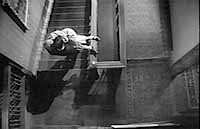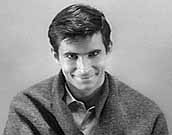Hitchcock plays a similar game with his audience in Psycho (1960). At
first we, along with Marian, Arbogast, Sam and Lila, think that Mrs.
Bates is alive and living in the Bates home. Hitchcock toys with us by
suggesting a reality to Mrs. Bates through the use of a voice over and a
vertiginious camera angle as Norman carries his mother down to the fruit
cellar.
 Next, we are given the Sheriff and his wife's version of
reality: Norman's mother died ten years earlier as the result of a
homicide/suicide with her lover. Finally, after Lila's investigation of
the Bates home, we "discover" the "real" reality: Norman killed his
mother and her lover but kept his mother's corpse around the house to
preserve her memory.
Next, we are given the Sheriff and his wife's version of
reality: Norman's mother died ten years earlier as the result of a
homicide/suicide with her lover. Finally, after Lila's investigation of
the Bates home, we "discover" the "real" reality: Norman killed his
mother and her lover but kept his mother's corpse around the house to
preserve her memory.
The final shots of the film, showing Norman
completely transformed into "mother," suggest another, deeper still
reality to the film. These shifting levels of reality suggest to us why
Hitchcock thought of Psycho as a "fun" picture—this film that is
largely concerned with the theme of voyeurism is an elaborate game of
discovering what is real and what is illusion.
 The last shot, as Norman
(mother) grins into the camera, suggest we have had a delightful black
joke played upon us; but it is a joke that audiences apparently loved,
given that Psycho was Hitchcock's most commercially successful film.
The last shot, as Norman
(mother) grins into the camera, suggest we have had a delightful black
joke played upon us; but it is a joke that audiences apparently loved,
given that Psycho was Hitchcock's most commercially successful film.


